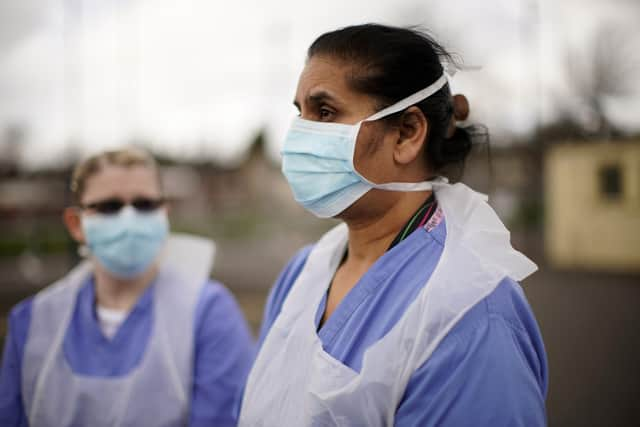The current problems in nursing have been a long time in the making - Sarah Dodsworth
Whatever their decision, it will not have been taken lightly. When putting their cross on the ballot paper the on-going staffing crisis that nursing faces day in and day out and the impact on patient care will have been at the forefront of their thoughts.
Nurses have been struggling with an overstretched NHS and increasing patient demand for years, but now they are facing breaking point. According to official figures there are a record number of nursing vacancies, and some 25,000 nurses left the profession last year alone in the UK. At the end of June this year, NHS figures show that there were 6,050 nursing vacancies across Yorkshire and the North East alone.
Advertisement
Hide AdAdvertisement
Hide AdThe reality is that the current problems have been a long time in the making. For more than a decade the RCN has been warning that the NHS and the wider health and care system are so short of nursing staff that patients do not always receive the safe and high standard of care they expect.


While the pressures piled on by Covid-19 have subsided, we are seeing pressures build again and the underlying workforce shortages, declining morale and unsustainable pressures remain.
The loss of nurses from EU countries, changes to nursing student finance in 2016, a failure to award staff a fair pay rise and the absence of a coherent workforce plan to retain experienced nurses as well as recruit new ones have all created a perfect storm for the NHS and created the extraordinary circumstances our members are now working under.
The RCN’s recent Last Shift survey, in which members shared details about staffing levels and the impact on patient care during their last shift at work, confirmed what we already know – that the NHS is struggling to cope under enormous stress and that the care of patients was being compromised.
Advertisement
Hide AdAdvertisement
Hide AdShockingly the survey revealed that nationally eight in 10 (83 per cent) of respondents said there weren’t enough nursing staff to meet all patient needs safely and effectively on their last shift. Whilst just a quarter (25 per cent) of shifts had the planned number of registered nurses. Less than one in five (18 per cent) said they had enough time to provide the level of care they’d like.
Of the 1,536 responses in Yorkshire and the Humber 73 per cent of respondents said there was a shortfall of one or more registered nurses on their last shift, and 66 per cent said there was a shortfall of one or more health care support workers. While 67 per cent of respondents said the actual number of nursing staff was not sufficient to meet all the needs and dependency of the patients/service users safely and 63 per cent said they felt that patient care was compromised during their last shift.
Nursing staff don’t go into the profession to deliver care that they know is below the standard they want to provide and that patients and their families rightly expect. Nurses need the proper resources to deliver a high standard of care.
A significant part of the answer to workforce crisis is pay. Back in June the UK government missed an enormous opportunity to tackle the problem of staffing recruitment and retention. Despite government ministers queuing to be seen clapping for the NHS every Thursday during the pandemic, they’ve completely misjudged the mood of nursing staff and the public by announcing another low pay award.
Advertisement
Hide AdAdvertisement
Hide AdThis year’s award increased pay by around £1,400 for 2022-23, enhanced for the top of bands 6 and all points of bands 7. Anyone can see that this amounts to a real-terms pay cut given that RPI inflation was 11.7 per cent at the time but is running at 12.6 per cent.
Unhelpfully, former Health Secretary, Thérèse Coffey even suggested that nurses could leave the NHS if they were unhappy about their pay. It just demonstrated how little the government value nurses; to treat the profession with such contempt.
Nurses across England are facing the very serious impact of a significant cost of living increase and fuel hike. NHS Trusts are opening workplace food banks to support their staff, whilst community staff who travel to care for patients in their own homes are being left in financial difficulties as fuel costs increase.
This is forcing NHS staff to leave for better paid jobs in shops and hospitality, with huge numbers of staff taking other jobs, or considering second jobs, outside of the NHS. When half of the NHS needs to open food banks for its own staff, ministers’ heads should be hanging in shame.
Advertisement
Hide AdAdvertisement
Hide AdTo simply stand by and do nothing to address these and the many other issues facing our nurses today is not an option.
It is now imperative that our political leaders act on the concerns raised by the RCN, our members, and the public.
Sarah Dodsworth is regional director for the Royal College of Nursing (RCN) for the Northern and Yorkshire and Humber regions.